(Click here to watch a short video clip of Mr. Jackson’s interview)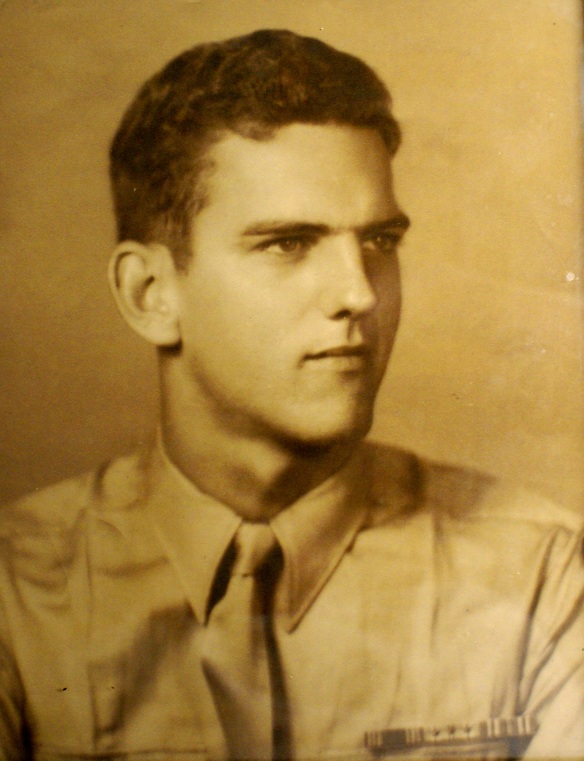
Staff Sergeant L.D. Jackson
US Army Air Corps — WWII Central Pacific Theater
Electrical Specialist — B-24 Bombers
Mr. L.D.Jackson of Hammond, LA brought out a small, yellowed laminated card with the following inscription on it for me to read as we started our interview. This card is his proof that he had been initiated into the “Domain of Neptunus Rex” for crossing the equator on a ship for the first time. As I read the card he proceeded to describe for me the initiation ceremony…
…”Domain of Neptunus Rex, Know ye that Jackson, L.D. Jr., Cpl. on the 18th day of November 1943 aboard the USS LST 240, Lat. 00-00, appeared into OUR ROYAL DOMAIN and having been inspected and found worthy by my royal staff, was initiated into the SOLEMN MYSTERIES OF THE ANCIENT ORDER OF THE DEEP.”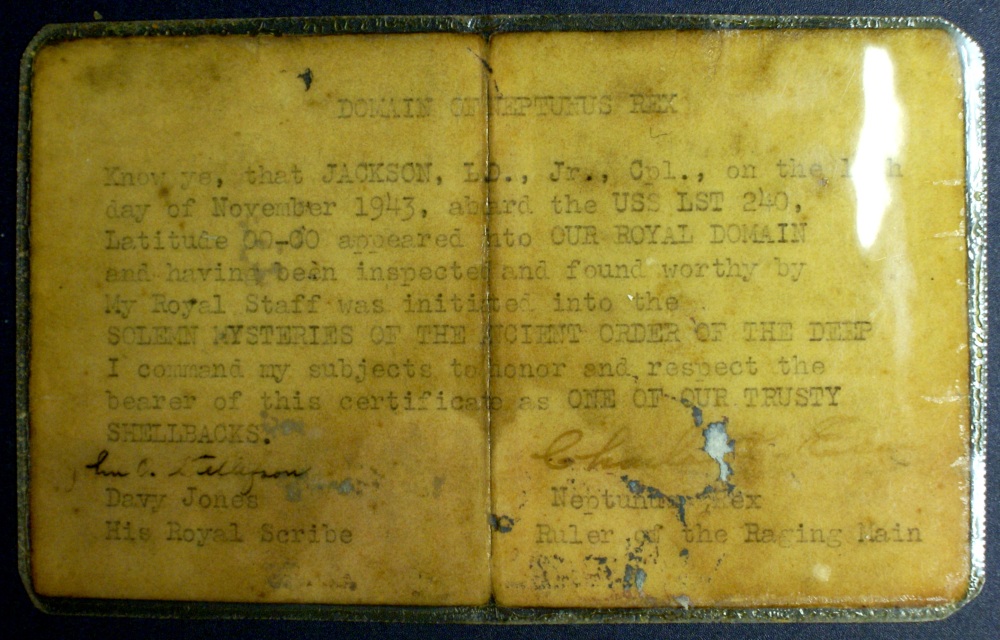
“When we were initiated…they had big tubs [of garbage] the kitchen kept…for a while and they had a barrel in it and you had to go through that barrel, swim through it and they cleaned us off with the hose and almost pushed us out in the ocean! The Navy did this [to] us – we were the Air Force. But it was fun. I was only twenty years old.
Let’s see … “and respect the bearer of this certificate as one of our trusty shellbacks.”
“See, I’m a shellback. Now you’re not flying over the equator – you have to be on a ship to get this, right here. I’ll bet you’ve never seen one.
I haven’t! I’d never even heard of that.
“Now you learned something.
Mr. L.D. Jackson was a university instructor by profession and is eager to help one understand not just what experiences he had in WWII, but the hows and whys of his experiences as well. I have Mr. Jackson to thank for helping me understand much more about WWII in the Pacific than I did before this interview!
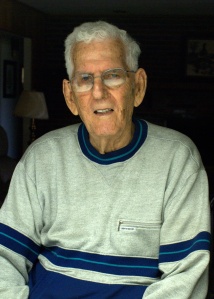 Mr. L.D. Jackson
Mr. L.D. JacksonWhat was your job?
“I was Electrical Specialist on B-24s [in the] Air Force. It was Army Air Force. That’s before it became strictly Air Force. And I became a Staff Sergeant.
Did you choose the Air Force?
“Well in a sense I did, but we had to take aptitude tests the first day we were in New Orleans. You know, not too many of the guys went to college back in those days. But I put that I went to college because I figured that would help me. And it did. Because the first thing they did was start sending me to school. And here I was an electrical specialist and the only thing I knew about electricity was putting a light bulb in. [I laugh] ‘Cause what did we have electrical in our homes? None! Not back in THOSE days.
“So I went to A.M. school – that’s airplane mechanic school. Then they sent me to electrical specialist school at another base. Then I went through a magneto [mag-NEE-toh] school at another place, and on and on and on till I worked myself up to Staff Sergeant.
“And what I did, I kept our planes where they’re in sync. The prop – I don’t know if you knew, but if you saw a plane going on a mission, they’d all get in line and they’d get over here and — boy, they’d rev up their engines!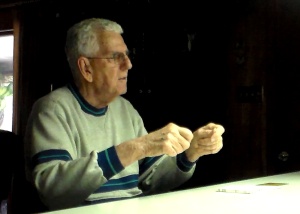 And what they’re doing, they’re checking their magnetos. Well I’m the one who kept the magnetos timed.
And what they’re doing, they’re checking their magnetos. Well I’m the one who kept the magnetos timed.
“See, the magnetos fired the spark plugs. And they’d watch the RPM of the engines, and they had two magnetos. So they’d take one off and they’d see how much it drops. And if it drops over ten, they can’t fly.
“So I kept the planes flying – HELPED keep’em – me and another guy helped keep the planes flying.
“They couldn’t go on a mission with those planes loaded with bombs to go bomb, you know.
Why were you on a ship on the equator?
“Oh, that’s to get where we were going. You see, the planes flew over [to the island] and our squadron had about 250 of us. They couldn’t get all of us in an airplane, and so the ground crew went by LST. [Landing Ship, Tank]
I see. So where were you headed when you crossed the equator?
“We were going into the Ellice Islands and we went to Nanumea. That was the name of the island that we were on. And I guess it was maybe a half-a-mile wide at the most and maybe a mile-and-a-half long.
That was a little spit of land!
“But the Japs never were on this island.
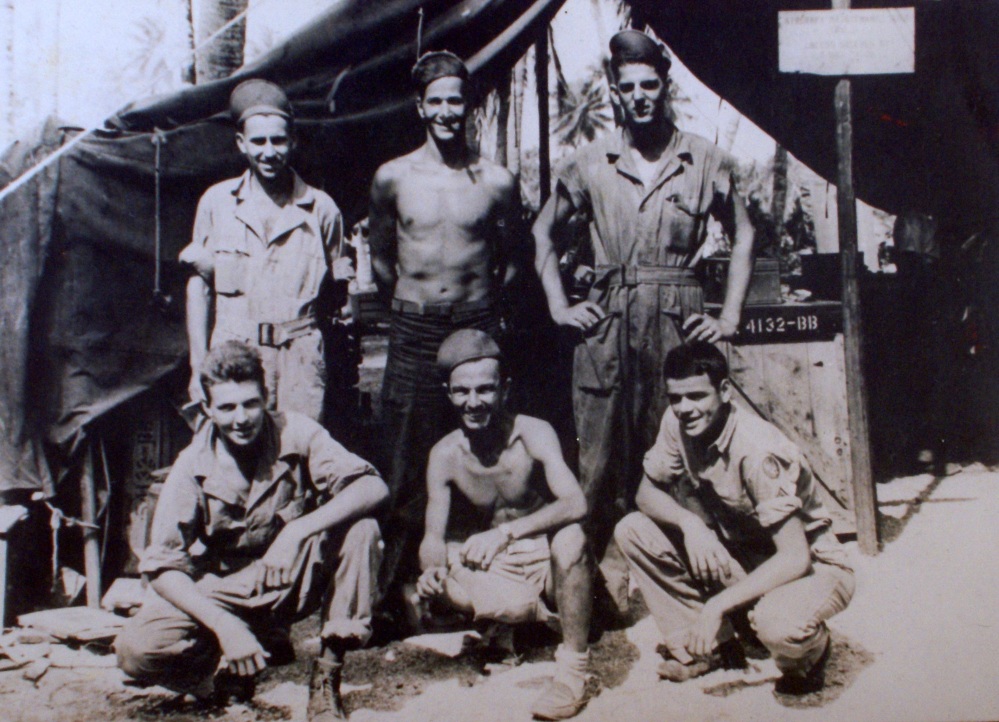 [Description on back of photo] Taken in the Ellice Islands on Nanumea -Nov. 1943
[Description on back of photo] Taken in the Ellice Islands on Nanumea -Nov. 1943(Front Row L to R) Sgt. Herman Keiser – Columbus, Ohio, Cpl. Duintzen – L.A. California (got as far as Kwajalien, lost large amount of weight – got out of service), Sgt. James B. Batt – Martinsburg, W. Virginia.
(Back row L to R) Our boss – T/Sgt Payne – Arkansas, S/Sgt Vogan, best buddy – Chicago, Ill, Me (L.D. Jackson), S/Sgt (Age 21)
“Did you ever hear of Tarawa?
Yes…vaguely.
“That’s the first [amphibious] invasion that the Americans ever made. That’s Tarawa. Well we bombed, [pointing] here was the Ellice Islands, and Tarawa was right here. So we bombed Tarawa before [we] took it.
“Then they took Tarawa and then they took Makin. I used to fly with them to the next island and get off and wait for them to go bomb. And when they returned, we could fix the plane if [it] needed fixing.
“We landed on Tarawa right after it was taken and they were burying the Japs. Well, they had a stack — a pile of Japs. And there was one — I took his dog tag and his cap – I mean, well, they were burying them [anyway]. Their dog tags were made out of wood. So I took the dog tag and the cap. I [later] went to LSU and there was a Japanese student there and he could read what was on it. This kid [Japanese soldier who had the dog tags] enlisted the same day I did.
Wow…
“Uh-huh. They were just burying ‘em in holes with bulldozers just pushing them in there.
“Then another time, I was on Makin when they were bombing Kwajalien [Kwa-zhuh-LEEN] and Eniwetak [On-uh-WEE-tok]. And I was on Makin.
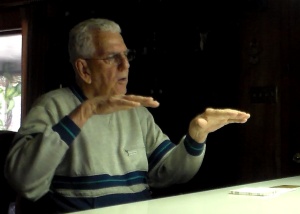 “And a B-25 radioed it’s coming in and they had straffed a Japanese ship. It went so low, it hit the cables and everything of that ship. And a cable got tangled up in the left engine of that B-25.
“And a B-25 radioed it’s coming in and they had straffed a Japanese ship. It went so low, it hit the cables and everything of that ship. And a cable got tangled up in the left engine of that B-25.
“A B-25 is a two engine plane. And the pilot was killed and the co-pilot was coming in and he was badly injured. We knew that because he had radioed in.
“And when he lowered the wheels, only one wheel came down. That co-pilot landed that B-25 with one engine, because the other had cable in it and they couldn’t feather the prop. It would just fall off. I mean when the plane stopped, you could just take the prop off.
“But anyway, he just made a beautiful landing as it skidded down the runway. And he was badly injured. I heard that he lost an eye, but I don’t know if that’s true or not.
“But these are the things that you see even when you’re on the ground. So I’ve seen a lot of plane crashes – not a terrible number, but three or four.
One is enough.
“Yeah, one is enough.
“I saw a lot of B-29’s when we were on Saipan. Siapan is [very close] to Tinian… maybe five miles — and you could see the planes going down the runway taking off. 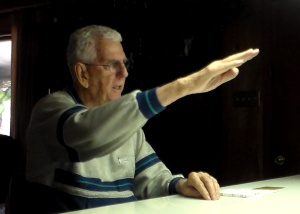 You could see the trucks running [around]. And the planes that dropped the bombs on Japan were from Tinian.
You could see the trucks running [around]. And the planes that dropped the bombs on Japan were from Tinian.
Oh, really!
“Yeah, they were B-29’s. And we had B-29’s on Saipan, but when the B-29’s used to come back from Japan, boy the red lights would be on ‘cause they wanted to land and they couldn’t. Then they would just land in the water and lose a B-29. I guess you call that a crash, but they all lived, you know.
They couldn’t land because —
“Well other planes were landing. Too many of them trying to make it back and they were running out of gas and everything. And one of ‘em landed [in the water] close to us…and one of our crew, he reached in and held the pilot’s arm, but he was under the water. He held his arm till his pulse gave away – we couldn’t get him out fast enough.
“And of course we [would] lose planes too. And we weren’t allowed – no…we were “instructed” not to talk to the flight personnel because they could get lost and we would lose a buddy, you see. So they didn’t want us to buddy up. Oh, we’d talk to ‘em – they’d come in and clean their guns, but they never even ate with us. They had their own eating quarters.
“And I pulled CQ one night – that’s Charge of Quarters – and lord, you could hear those guys screaming over there and they’d [say to each other] “oh, you’re alright, you’re alright.” I guess they’re dreaming they’re over a target or something.
“It must have been incredibly stressful…such a strain.
“‘Cause a lot of times we’d lose a plane – we lost one — our plane had 10 or 11 on the plane, on the flight – the gunners, you know, and all that, and all of ‘em was from New York.
“Some would say, “You remember the crew from New York? That’s the one that we lost,” you know.
“Then we had a bombardier fall out [of] the plane. Our bomb bay doors close this way [brings hands down and together]. 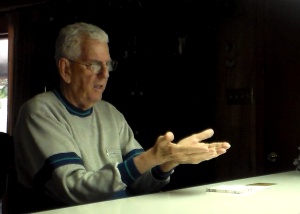 Well, one of the bombs didn’t go off. He was putting one foot on what we call the catwalk that’s between the two bombs to get to the back of the plane. And the other foot was on the door. Well the bomb fell off and hit the door and he and the bomb went out in the ocean and he didn’t have a parachute on or anything. And oddly enough I know his name – I didn’t know him, but his name is Ford. So the next time they went on a mission they dropped a big bouquet of flowers about to where he was.
Well, one of the bombs didn’t go off. He was putting one foot on what we call the catwalk that’s between the two bombs to get to the back of the plane. And the other foot was on the door. Well the bomb fell off and hit the door and he and the bomb went out in the ocean and he didn’t have a parachute on or anything. And oddly enough I know his name – I didn’t know him, but his name is Ford. So the next time they went on a mission they dropped a big bouquet of flowers about to where he was.
“So you go through a lot of things like that.
“And then several times the planes would come in and they’d been shot up by a pursuit plane and one of our guys in a plane got hit and there’s blood all on the inside and you gotta go work in there. So remember now, we were out on the equator. It was hot over there. And you work inside that plane and man, you’d sweat!
“It was great. I loved it. And I worked twelve, fourteen hours a day. No need to go sit in my tent.
You’d just sit there and bake.
“Yeah, that’s it. I mean there was nothing else to do!
“We went to Nanumea and then the next place we stayed was Kwajalein, and then we went to Saipan and all these little places. Now Saipan! We thought we had hit the United States because Saipan was big! They even had a mountain on it. I mean what they call a mountain. I think Saipan was about 15 miles wide and 45 miles long. And they had two air strips and so forth like that. But all these other little islands we was on, only two squadrons could be on it. Like I said no civilians, no city, not anything was on the island.
How DID you pass the time? Just working?
“Uh-huh. And do you know? I never did see an argument. The whole time. I lived like that for a little over two years. 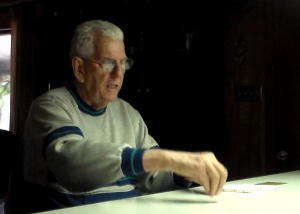 I never did see an argument. We were all happy with each other. I’m talking about the ground crew. And we all helped each other.
I never did see an argument. We were all happy with each other. I’m talking about the ground crew. And we all helped each other.
How many would that have been? The ground crew.
“Let’s see, each plane – I would say a hundred and twenty – but each plane crew had its own crew chief and four mechanics and we had 15 planes.
I didn’t realize there was a separate crew for each plane.
“Right, each plane had a name and you always had a favorite. And when I flew, I always liked to fly on a certain plane – and when that pilot landed, he was just as smooth. He didn’t bounce his plane when he landed. You get to know that – [about the pilots].
What was the name of your favorite plane?
“I can’t remember — I DID know all the names.
“We did have the most famous plane in the Pacific. I KNEW the name of this one! “Bolivar.” It had over sixty missions on it — and they flew it back to the United States for a bond tour to sell bonds — and they crashed it.
“So what Consolidated did was build another Bolivar [Jr.] and sent it back. So we had the most famous plane in the Pacific in MY squadron.
“And I’ve never seen a crash caused by a lack of maintenance – like a plane coming in and getting a flat tire, or something like that – never. We all worked together. We were a happy family.
 “Like — being a specialist — I didn’t even have to take the cowling off the plane. The cowling is the cover of the plane — but I did. Because those other mechanics, they had work to do, you see. But I could have had the mechanics who worked on that plane take the cowling off for me and put it back. But I HAD the TIME, so I didn’t mind doing it.
“Like — being a specialist — I didn’t even have to take the cowling off the plane. The cowling is the cover of the plane — but I did. Because those other mechanics, they had work to do, you see. But I could have had the mechanics who worked on that plane take the cowling off for me and put it back. But I HAD the TIME, so I didn’t mind doing it.
“And, each plane had a 25-hour inspection, a 50-hour inspection, a 100-hour inspection. Now boy, that 100-hour inspection was a biggie! [In that one] they took all the cowlings off all the engines. Our planes each had four engines on it. And we inspected everything on that plane. I mean from the magnetos to the fuses. Everything! Then after 400 hours of flying they put new engines on them.
“We always had something to do — I mean we didn’t have to rush to do it.
How many of the islands had airstrips on them?
“Any of reasonable size. We were on Nanumea — the Japs were never on Nanumea.
 “And [there was] another island nearby. We had four squadrons, but two of them stayed here [Nanumea] and two of them stayed [on the nearby island]. And when they’d go on a mission, they’d meet [in the air], go out, come back in and go back to their island.
“And [there was] another island nearby. We had four squadrons, but two of them stayed here [Nanumea] and two of them stayed [on the nearby island]. And when they’d go on a mission, they’d meet [in the air], go out, come back in and go back to their island.
“But[ Nanumea] was a beautiful little island. It had coconut trees and the natives used to come over in their little “pirogues” that had the little “wings,” you know, and get coconuts. I’d see them climb the coconut trees — they’d take a little rope and put it around their legs this way and they’d scoot up and get their coconuts. And then they’d come down and put a stick in the ground and they’d use it to take off the skin this way [motions with hands like a coconut coming down on the stick].
 “And they’d say, “[pointing to the men and then to the stick]” — you know, they couldn’t talk English.
“And they’d say, “[pointing to the men and then to the stick]” — you know, they couldn’t talk English.
“Man, I tried, but I just stuck it [the coconut]. I could never do what they do and they’d laugh at us, you know.
So there was some civilization around…
“Only on that one island. But on the other islands, no natives at all.
“In fact, when we went there, it was so shot up, it was just gone. And once the SeaBees came in there and cleaned up, there wasn’t even a tree standing up. It was just wide open.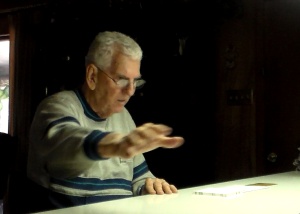 I could stand up on top of a plane and see water 360 degrees around me.
I could stand up on top of a plane and see water 360 degrees around me.
I’ve seen pictures of the atolls and they’re just like a little…
“Like a little pond-like.
…little spits of land with an airfield on them.
“They’ve got an airfield…and where there’s a plane, you’ve got to make sure [your] tent is where you don’t get the propwash that could blow your tent down, you see. Oh it was fun.. [chuckles]
You were twenty?
“I was just twenty. And then twenty-one, and twenty-two. Cause I never did get home.
So how long were you out there?
“Three, almost four years. Three and a half years.
“[He chuckles] Oh, now I’m [recalling] back in the states before we went over. [They sent us out to] the Mojave Desert – ’cause I guess they knew where we were going. But they told us we were going to Alaska – in the Mojave Desert – [I chuckle].
“But anyway, I did have a pass to go home — a furlough, to go home. Our planes flew in the day time — in the Mojave Desert – no air conditioners or fans, no anything – so we tried to sleep during the day time to get a little sleep.
“So I was on the top bunk [one day] and I had my barracks bag all packed to go the next day and I had my pass underneath my pillow. So here comes my good buddy and the First Sergeant.
“’Jackson, wake up, wake up!’
“I woke up.
“’Where’s your pass?’
“So I gave it to him. And he took it and tore it.
What?!
“Ahn, no. I was the comedian. They always classified me in my squadron as the morale builder.
I could see that.
 Staff Sgt. Vogan
Staff Sgt. Vogan“They were trying to get even with me – my buddy – he was twelve years older than me. And he’s the one who taught me what I know how to work on planes. He was a real electrician for a big bread mill in Chicago. He was from Chicago. Vogan was his name. He took me under his wing…and taught me everything.
“But anyway, they just thought that was the funniest thing. So they gave me a three-day pass. They had their fun with me. It didn’t bother me. I didn’t mind.
“And I used to like to go to Hollywood and go to the Palladium. We’d dance to the Big Bands – in person.
Wow…like Glenn Miller?
I didn’t see Glenn Miller. I couldn’t get there when he was there, but you know, I’ve seen just a whole bunch of Big Bands that were playing there. And I still like it. That was the only good music that was ever had.
 “But you couldn’t jitterbug because the floor was too crowded. And there wasn’t a straight piece of wood on the dance floor. It started in the middle and went out [in concentric circles]. And HARDWOOD too! You ought to see it. It was a beautiful floor! It was a nice place. I used to go to the Palladium all the time. I think it only cost us sixty cents to get in! [chuckles] Yeah! And a drink was only fifty or sixty cents.
“But you couldn’t jitterbug because the floor was too crowded. And there wasn’t a straight piece of wood on the dance floor. It started in the middle and went out [in concentric circles]. And HARDWOOD too! You ought to see it. It was a beautiful floor! It was a nice place. I used to go to the Palladium all the time. I think it only cost us sixty cents to get in! [chuckles] Yeah! And a drink was only fifty or sixty cents.
Who of your family was left here when you were overseas?
Just my mom and dad. They were living in Gramercy [Louisiana].
Were you an only child?
Oh, no! I had a brother and he was already a Master Sergeant when I went in. He was in the south Pacific and he survived. He was in the Air Force, too.
What was the date you went in?
Let’s see. I’m gonna have to guess. It was ’42. Say June. It was hot. I can remember that! And I got out in November of ’45. Yeah, I was one of the first groups to get out because I never did have a furlough, you see.
So the point system let you go home earlier than some others?
Yeah, they had some kind of point system. So when the war ended, I was one of the first groups that got out of there.
Being so remote, were you able to correspond very much with back home?
“When I was in? Oh, yeah! I think, what they had was, E mail?
They had V-Mail…
 “V-Mail! That’s what it is! V-Mail! It was a little bitty envelope. Yeah, V-Mail. That’s what it was.
“V-Mail! That’s what it is! V-Mail! It was a little bitty envelope. Yeah, V-Mail. That’s what it was.
“And, lord, when we would ship out from this island to another island, well we wouldn’t get any mail, obviously, ‘cause I was on a ship going…THEN we’d get mail and have about fifty letters!
You had to put them in order to read them!
Yeah, it was no fun readin’ em, you know. ‘Cause it was just repetition, repetition, repetition. You like to get a letter or two letters [at a time], you know.
No, we got a lot of mail! It was good. We had enough. In fact my parents used to send me food.
Really! It made it all the way out there?
It made it all the way out there. Not often, but like for Christmas or something.
What kind of food did you eat out there? Rations? Regular meals?
Well…that all depends…… [I chuckle] I can remember going to the mess hall and [asking], “What do we have?”
“Goat.”
You know, that was the expression. So I didn’t even go. I’d go out to the plane and get me a little ration and I ate it out at the plane — plane rations.
Goat?
 Ha ha, that was an expression. Man…[wrinkles his nose in disgust] if I cooked…it wasn’t any good either. I could take an egg and make it change color… [We laugh] You know, I lost 25 pounds overseas. When I went overseas, I weighed about 212 – 215. I came back, I weighed 175.
Ha ha, that was an expression. Man…[wrinkles his nose in disgust] if I cooked…it wasn’t any good either. I could take an egg and make it change color… [We laugh] You know, I lost 25 pounds overseas. When I went overseas, I weighed about 212 – 215. I came back, I weighed 175.
You would have blown away! [He’s about 6’3”]
Oh it was alright! It didn’t bother me.
You were probably good and tanned, too!
“Oh boy, was I TAN! I was WELL tanned. It didn’t bother me…cause I just enjoyed being with the group I was with.
“I just had fun – and even in my work – a lot of time I would pretend I was mad or something – you know, I’d use some bad words. And man, they’d be out there laughing at me! And I’d be cussing this [the plane part he was working on]. And I was laughing at them, laughing at me!
“But I wanted to help them think of something other than being away from home. Because I have one – his name was Carpenter – he was a Crew Chief. All Crew Chiefs were Master Sergeants. I guess we had in my squadron thirty or forty Master Sergeants. But we didn’t pull rank on each other. We didn’t even think about it.
 “But Carpenter – his wife wrote him a “goodbye letter.” And oh, it just about killed him.So we all really worked at making him feel good. I can still see him sitting on an old plane that had crashed. And he was sitting on that crashed plane by himself , you know, just sobbing away. But that’s the only one I saw ’cause there wasn’t too many of us married. They were young like me, you see.
“But Carpenter – his wife wrote him a “goodbye letter.” And oh, it just about killed him.So we all really worked at making him feel good. I can still see him sitting on an old plane that had crashed. And he was sitting on that crashed plane by himself , you know, just sobbing away. But that’s the only one I saw ’cause there wasn’t too many of us married. They were young like me, you see.
We were just one big happy family out there. Like I said, I never saw a fight or an argument in the two years I was over there.
That’s amazing – that close of quarters, and that hot, and that stress…
“Yeah. Stressful.
“And we had to keep those planes in good shape and everything. But I don’t know how we got all the parts.
I was going to ask you that. Did they ship them out to you or did they have them in storage?
“I. Don’t. Know. And on those little islands. How’d they get them into that island?
“I was on Saipan and they had a plane that went down and they had a General in it. General Marshall I think his name was. So they needed a crew to go back to look for them. To search. So they flew me back. Did you ever hear of a movie star named Tyrone Power?
I flew with him!
You did!
Now when I say, “I flew with him,” I was in the plane he flew.
He was a pilot?
He was a pilot. And he didn’t fly a bomber. He flew like commercial planes. But it was a two-engine plane.
So when they flew me back, well there was a bunch of other people, so I was in the plane that flew back from Saipan to Kwajalien with Tyrone Power as the pilot! When we got to where we were going, I made sure to walk right by him – I could have touched him. But I didn’t talk to him or anything.
Well during the flight, he went back to the back of the plane to relieve himself, but when he walked through, one of the guys sitting there asked him for his autograph.
He said, “No, I’m a soldier just like you.” He said, “I’m no better than you are.”
And I never forgot that. But that’s what he told that [fellow].
That shows his character.
But the soldiers took it good. And we thought it was big.
But that was another good experience I had in the service.
“When I got back over to [Saipan], there was a B-24 there that had been grounded for about a week. Nobody could fix it. … So they came and got me. Shucks, in fifteen minutes I found the problem. And the only reason I’m mentioning this is, they didn’t have the part.
I needed a waste gate motor.* I had never changed a waste gate motor in my squadron. That’s the first time I had ever seen it. But I knew how to check for it, you see.
“They said, ‘We’ll have it tomorrow.’
“The next day, it was there. So they came and got me. And when I put it on and they checked it –
“‘That’s it!’ [the pilot said.]
“The pilot came and hugged me. And all the crew came and shook my hand… they’d been stranded there for a week ‘cause nobody could fix the plane. So it made me feel good, you know…to know — man, I did something. Here’s a little old staff sergeant…and when the plane took off I watched it thinking, ‘Man, I hope that engine keeps running!’
And you don’t know where it came from so quickly? They must have had a great system!
Now where’d they get that thing from, I don’t know. I guess they radioed in. But the next day, they had that motor. I’ll never forget that.
And, we used to go in the plane and listen to the music from the [Hollywood] Palladium. We didn’t have our own radios. But we used to go in those planes and listen to the good radios.
“I had some great experiences. And for some reason, it seemed like [all the men] took a liking to me, you know what I mean? They liked my old southern person. ‘Cause I was with a whole lot of guys out of Chicago and those places, you know. I was just an unusual type of character, I guess.
But, a pleasant one.
I try to be, anyway.
So you were there for over two years in those little islands. Where were you for the rest of the time?
Well, in the States.
For Basic Training?
I was in the States for about a year before I went over, you see, going to school. I was stationed in Texas first, then I went to Illinois, then I went to northern California and then southern California.
When I was at March Field [southern California] – now this is one time they did fly me – I was the co-pilot of this little plane. And one of the officers – I’m sure the plane he was going to fly by himself to where he was going, but he needed someone – and I flew back to San Francisco with him from southern California to northern California to go to school – to go to magneto school, but I came back by train. They didn’t fly me back! But anyway, I was the co-pilot, you know – I didn’t do anything – except sit in that little single engine plane. But I flew with him. Just another nice experience I had.
So other than seeing planes come and go from missions, you weren’t in the middle of any kind of combat, were you?
Oh yeah! We got bombed!
Well, I want to hear about it!
One night – now we weren’t really bombed [on the other islands] until we got to Saipan. Planes came over and we could see where a bomb went off out on the – you call it the line – that’s where the planes are. And they had B-29’s there. And they hit a loaded – meaning it had bombs in it. They hit that plane and that thing blew up and a big cloud of smoke that rose this way, this way, up there [demonstrates it going higher and higher].  And when it got up here, it exploded. Don’t ask me why, but it must have been the gas in that plane. And it just lit up the whole island.
And when it got up here, it exploded. Don’t ask me why, but it must have been the gas in that plane. And it just lit up the whole island.
I mean it just “Hwwhooooo!” That was really an experience! 
“And then another day, I had my mess kit in my hand, so it must have been around lunch time, I was going from my tent to the mess hall and here come over fifteen Jap planes. And one of ‘em was so low I could see he had a scarf around his neck.
Oh, wow.
“Now he wasn’t looking for me. It was a suicide thing. And they were after those B-29s. And it was fifteen of ‘em and they kept going around till everyone of ‘em was shot down. But the one that came over, I bet he wasn’t any higher than those trees up there. And he just went around and eventually he got shot down.
So they didn’t dive into the planes on the ground like a kamikaze?
No, no. They were dropping bombs on ‘em. And I wasn’t on the line. Some guys were on the line, cause I was getting me something to eat I guess cause I had my mess kit. I heard the machine guns go off, but I thought it was just guys practicing, you know, and I looked up and there’s planes coming in.
Where you ever scared?
No, it didn’t scare me. I just knelt down and watched and then he left [me] and all the other planes – it wasn’t long until they were all shot down.
Where were you at the end of the war when they dropped the bombs on Japan?
Saipan [all the bombing runs to Japan and back].
Most probably I saw where the plane [Enola Gay that dropped the atomic bomb on Hiroshima] – no I didn’t – but I COULD HAVE been able to see the plane take off Tinian to go bomb it, you see. They did that all day long. We could here ‘em two o’clock in the morning taking off over there.
“Then we went back to Hawaii. They told us we were going to go into some B-32s, I think, but I knew they knew something.
“The war hadn’t ended yet when we got back to Hawaii and it wasn’t long until peace came around.
“God…did I see some drunks that day. I can still remember there’s a sailor laying on the walk. And everybody’s just stepping over him. I never was a – oh I drank my share at times – but I didn’t want to drink anything that day.
So how did you feel?
“Oh, I was just watching these crazy guys. I can even remember going down Kapiolani Boulevard and I was in Waikiki Beach. See I used to go to Waikiki Beach and I used to like to surf.
Oh really!
“Oh, yeah. I surfed a lot on Waikiki Beach, me and two other guys – Johnson and Shaheen. And we used to go out and surf. We weren’t as good as the [native Hawaiians], you know, but we could stand up and come on in. And our surfboards weren’t like the ones now. Our surfboards were taller than me. You know that’s what they had back in those days, [not] like these nice little surfboards they have now.
So you learned to surf over there? Because you sure didn’t learn in Louisiana!
Oh no, I learned at Waikiki Beach. I used to watch the little Hawaiians – they let the surf come in — now these are the little kids. And they would run this way and right in that shallow water and skid right in on their stomachs! There’s no WAY I would try that — I’d just make a big ole hole in the sand! [We laugh.] 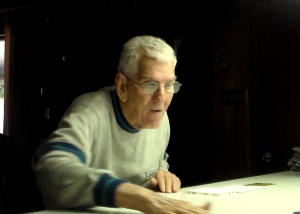
“But they could just run and watch when the water would come in and, boy, Shooooo!
“And they would go [fifteen feet]! And they’d get up and wait for another one!
“And I saw Hawaii when it was Hawaii. No hotels. The only hotel they had there was the Royal Hawaiian and the Navy took it over.
“But now on Waikiki Beach, there’s nothing but big hotels. I took my wife there. I wanted to show her where I was. I wanted her to see Pearl Harbor, you know. ‘Cause I saw Pearl Harbor when it was – still working on ships trying to get them upright.
“When we shipped out – I didn’t know what an LST was.
I don’t know what an LST is.
It’s a small ship and they open up in the front to take tractors and other cargo.I saw those little LSTs at Pearl Harbor.
“So I saw this Navy guy. ‘Do those things go out in the ocean?’ You know, I just thought they went from this pier in Pearl Harbor to bring something over to this one, or something. Oh, dummy me. What did I know? That’s what I thought.
“So he asked me, ‘What ship are you on?’
“240,” I said.
“He said, “That’s the one you’re going down-under on.”
“And that’s when I found out those little things – and lord, you talking about – you sit out there – the back of the ship is called a fantail. So you sit in the back, and you see where you’ve been. It leaves a long trail. And you can see it where they changed directions so in case a submarine sees them.
“Or at night, we used to go ride in the front and look down and see the phosphors in the water. They light up. And the little flying fish — they’re about that long [shows with hands about one-foot long]. And if the water’s rough, they’ll even get on deck!
Really!
“Uh-huh, they’re only about that big. But they’ll flip and get back in the water. And that gave us something to do at night. And we never did go down and sleep in our bunks because it was too noisy and too hot. So we’d just take a blanket and fold it and sleep on deck. Take a little nap. And we were only out there for about four or five days.
That’s from Hawaii?
“No, from one island to the next island. Like going from Kwajalien to Saipan.
I know, you don’t think about them being that far apart.
“No, but some of those are only about three days. They’re a little bit closer.
“And when I told you they flew me back with Tyrone Power… that’s when I went from [the island] back to Hawaii — and my squadron went back to Hawaii. But I never remember how I got back [there]. I don’t remember that at all. I guess everything was so routine. I don’t know if they flew another plane in to get me or when they were flying in they stopped and picked me up. But I made it!
* (Mr. Jackson’s description of a waste gate motor) “Because you see, what a waste gate motor is – it’s a motor that – like this is your exhaust pipe from your plane – you know, your car has an exhaust pipe, right? Alright, see, what they use – they use that exhaust gas to turn a wheel for super charging. And it forces air into the engine for super charging. And the way they regulate the speed of that is by a gate, that if they don’t want as much, they open the gate up. If they want more power, they close that gate. You see, this way [demonstrates by rocking his flat hand over the vertical edge of his other hand]. And that’s the only one I’ve ever worked on the whole time I was in the service.
Okay, now remember there were two main generals in the Pacific, now who were they?
Macarthur and ….
“Nimitz.
Oh, right.
“Now, where was Macarthur?
The Philippines.
“Right. In the south. And where was Nimitz? In the central. You following what I’m trying to tell you? That’s the Army and the Navy. All politics.
“So, Nimitz — see I was under Nimitz. I was in the Army [Air Corps], but Nimitz was in the Navy. But see we were under the Navy. And so it was Nimitz that decided not to go another route into Japan. He took this route here. So that’s when we went down to the Ellice Islands and the invasion was Tarawa. And we went through Central Pacific. Alright, so, Japan is over here – I’m gonna show you – [he goes to get a globe].
 “Now instead of going way out here – Truk. Are you familiar with that? Truk Island — that’s the Japanese “Pearl Harbor”. We used to bomb Truk. We’d just keep it incapacitated. Oh we’d hate to bomb Truk because it was so well fortified that we’d sometimes lose some planes over there, you see. So instead of trying to take ‘em, we just bombed ‘em where they just had to stay right there. it’s Nimitz who decided to do that.
“Now instead of going way out here – Truk. Are you familiar with that? Truk Island — that’s the Japanese “Pearl Harbor”. We used to bomb Truk. We’d just keep it incapacitated. Oh we’d hate to bomb Truk because it was so well fortified that we’d sometimes lose some planes over there, you see. So instead of trying to take ‘em, we just bombed ‘em where they just had to stay right there. it’s Nimitz who decided to do that.
“Okay here’s Saipan and Tinian. That’s where the B-29’s came from to bomb Japan – from [Tinian to Japan and back] in about 16 hours. Think they were tired when they got back? Can you imagine doing that?
We don’t think about how far that is. That distance is like the height of the United States!
“That’s exactly right. It took some men to do that.
Yes it did.
“Saipan had two airstrips. We had to move to the smaller strip [with the B-24s] to give the B-29s [room] – I saw the first B-29 to land on Saipan. Saipan had B-29s before Tinian. Saipan was secured a little before Tinian because we used to watch them fight over on Tinian. We could just see ‘em shooting. We couldn’t really understand what was going on. Just a couple of days. Then everything got peaceful.
“But anyway, they took us off our strip and then we heard there was a B-29 coming in so we all went to see the first B-29 land on Saipan. And we were all a little disappointed because they were talking about how big they were. And of course, our simple minds, we thought they were going to cover the sky, you know. And they were a lot bigger than a B-24.
They were a little over publicized?
“Just with us it was.
“But that’s where I was. You see, right there. [on Saipan and other islands]
Well good, now I can picture it.
So what about VE Day? There you are on an island when the war ended in Europe. Did you even think about it?
 “Not too much. We knew that we were going home shortly. But I was on rest leave on Hawaii when the war ended. And man, that’s when they went crazy!
“Not too much. We knew that we were going home shortly. But I was on rest leave on Hawaii when the war ended. And man, that’s when they went crazy!
“So I had a good time. I had a good life out there. But like I said, Tarawa, Makin, Kwajalien, Eniwetok and Saipan – see that’s your Central Pacific – headed to Japan – and it was all done by Nimitz.
So you just moved forward toward Japan.
“Just moved forward. As soon as they would take an island, and the Seabee’s would go in there and clear off the field and level it off, our planes could land. They’d get enough LST’s to get us there. And then they’d start bombing the next island. See, we bombed Kwajalien until they took it and then we landed there. And then we’d bomb the next one, take it and move over there – plus a lot of little islands that the Japs had airstrips on. We’d bomb them.
“[Our men would be loading bombers and] I’d say, “Where y’all going today?” And they’d name [an island] and I’d never heard of it.
And there are SO MANY little islands out there…
“Yeah, little — not even half a mile wide.
Just a little sand.
“That’s all it was. And just about two or three feet above sea level. And we’d pitch a tent. I never pitched a tent. We’d get there and all the tents are put up.
So being on the equator like that, were there ever any storms like hurricanes? I guess it was just hot.
“It was HOT. Better than being cold though. I’d rather work where it’s hot than where it’s cold – I mean doing mechanical work with your hands. I can’t visualize going to Alaska and handling nuts and so forth. You gotta take your gloves off. I don’t know how they do it.
“I put nuts on with the left hand, but I’m right handed. You know why? Because normally you work on the right side of an engine. You can’t [reach around to the left side with your right hand]do it this way, so you learn to do it [with the left hand]this way. And I had to learn. I dropped many a nut before! I got good at it. After a while I could be talking to you and be doing my job, I did it so often – little bitty nuts.
“I had some good experiences.
And you had a good attitude through it all, which is amazing.
“Oh, I loved it. And I liked my men.
You’ve got some people who fight it the whole time.
“I never did see anybody do that. I never did see anybody raise their voice to each other. And we were out there for two years.
That’s amazing. To be in that close of quarters.
“We made jokes out of everything and I hope I had a little to do with it. And I’m sure other ones were like me. I just appreciate it that I didn’t have to go in there with a gun.
Yes! I can’t imagine.
 “I’d have done it. You do what you have to — what you’re told to do.
“I’d have done it. You do what you have to — what you’re told to do.
It took everybody.
“That’s right — to do it.
It took somebody to get that part to you that next day!
“That’s right! That’s the one thing that puzzled me. I never did ask. If I needed anything – a generator, a solenoid, a magneto – I had it! A generator, boy I changed a thousand generators! And those things weighed fifty-six pounds. And you should have seen the first one I changed. I bet it took me over an hour. Now I bet I can change one in fifteen minutes. I mean, everything gets routine.
“And changing those nuts with my left hand. I was a worker.
It sounds like it.
“But I loved it. What else was I gonna do? Go sit in my tent?
“And I was keeping the planes flying safe, and so forth. Oh, it was great.
 [Looking at his own portrait] “I didn’t look too bad, did I?
[Looking at his own portrait] “I didn’t look too bad, did I?
No, you didn’t! You were a handsome fella!
“That was Saipan. I guess I was twenty-two or twenty-three right there. ‘Cause I was twenty-three when I got out.
Well I really appreciate you taking the time to do this.
“Now remember the difference between Nimitz and Macarthur. Nimitz is central and northern and he’s the one who really got us over there in Japan.
Macarthur went to Australia for a while.
‘Yeah, he was in the south Pacific. Now he did his job, don’t get me wrong –
…but the advances were made by Nimitz
“…that got us to Japan – but we couldn’t have done it without Macarthur you know, keeping them busy down there. And then you can remember Army and Navy. South and Nimitz. And all these little islands. Keep in mind, [the order,] Makin….Kwajalien….Eniwetok…Saipan.
I will, Mr. Jackson. I really appreciate you taking the time to do this.
“Oh, I enjoyed it, Honey.
I’m going to go home and pour over these little islands and I’m going to learn all about them. Thank you so much!
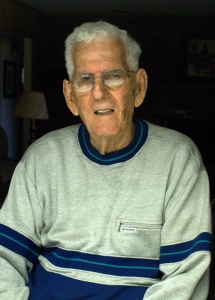 L.D. Jackson
L.D. Jackson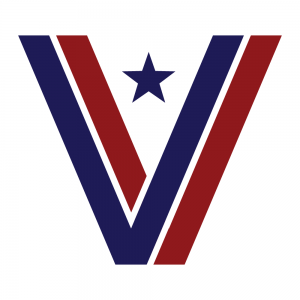
Thank you Mr. Jackson for sharing your experiences. And thank you for teaching me chemistry at SLU
In the 1980ies.